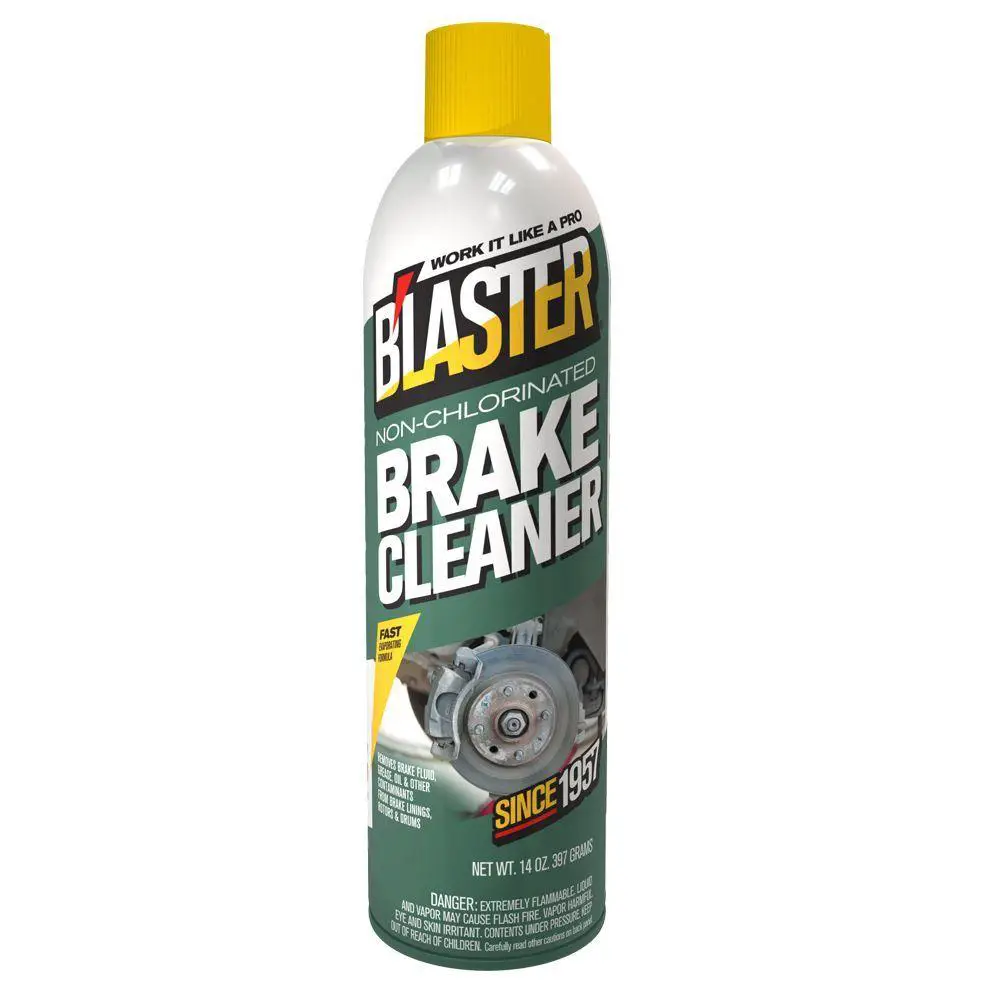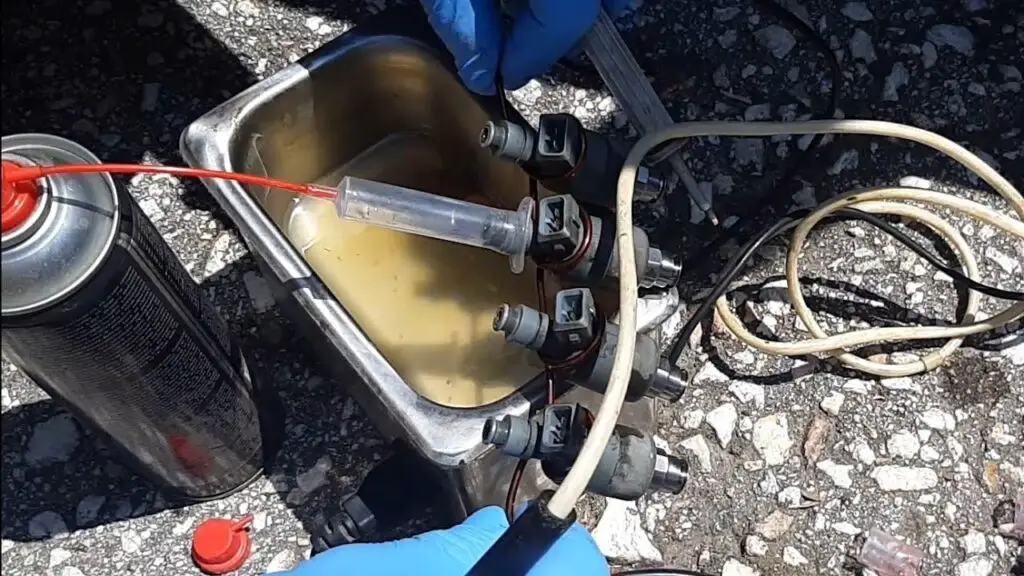Cleaning injectors with brake cleaner can remove surface dirt but may damage seals and internal components. It’s a temporary fix and not as effective as professional cleaning methods.
Fuel injectors are critical components of a vehicle’s engine. They ensure that fuel is precisely injected into the combustion chamber at the correct time and in the correct amount. Over time, fuel injectors can become clogged with carbon deposits, dirt, or other impurities, which can negatively impact engine performance, fuel efficiency, and overall vehicle operation.
A common DIY method for cleaning injectors involves using brake cleaner. While brake cleaner can be effective for cleaning certain engine parts, it’s essential to understand how to use it properly and the potential risks involved.
This guide will explore the process of cleaning injectors with brake cleaner, the benefits, the risks, and how to do it safely.

Contents
- 1 What is Brake Cleaner and How Does it Work?
- 2 Can You Clean Fuel Injectors with Brake Cleaner?
- 3 Risks of Cleaning Fuel Injectors with Brake Cleaner
- 4 Step-by-Step Process: Cleaning Fuel Injectors with Brake Cleaner
- 5 Alternatives to Brake Cleaner for Cleaning Fuel Injectors
- 6 When to Seek Professional Help
- 7 Frequently Asked Questions
- 8 Conclusion
What is Brake Cleaner and How Does it Work?
Brake cleaner is a solvent designed to remove grease, oil, brake dust, and other contaminants from brake parts. It is a potent and fast-evaporating cleaner commonly used in automotive maintenance. Brake cleaners are made with chemicals that dissolve oils and sticky substances, which is why many car enthusiasts consider using it to clean components like injectors.
However, it’s important to know whether it’s a safe and effective method for cleaning fuel injectors, which play such a critical role in engine performance.
Can You Clean Fuel Injectors with Brake Cleaner?
Yes, you can technically use brake cleaner to clean fuel injectors, but it’s not the ideal method. Brake cleaner can dissolve carbon deposits and other contaminants, but it might not reach deep into the injector components.
Additionally, using brake cleaner improperly could lead to damage, especially to the seals and internal components of the injector. Therefore, while it’s a common DIY method, brake cleaner should only be used with caution, and there are better alternatives for a thorough cleaning process.
Risks of Cleaning Fuel Injectors with Brake Cleaner
While brake cleaner can effectively remove surface contaminants, using it to clean fuel injectors can pose several risks. Knowing these potential dangers is essential to ensure you don’t inadvertently cause damage to the vehicle’s fuel system or engine components.
Damage to Rubber Seals and Plastic Components
Brake cleaner is made from strong chemicals like acetone, which can be harsh on certain materials, including rubber and plastic. If the brake cleaner comes into contact with rubber seals or plastic parts inside the injector, it could cause these components to degrade or fail, leading to leaks or injector malfunctions.
Incomplete Cleaning
While brake cleaner can remove surface dirt and carbon deposits, it might not fully clean the inner parts of the injectors. Over time, carbon buildup can accumulate on the nozzle or inside the injector, which may require more advanced cleaning methods like ultrasonic cleaning.
Health and Safety Concerns
Brake cleaner contains volatile organic compounds (VOCs) that can be harmful if inhaled or if they come into contact with skin. It’s essential to work in a well-ventilated area and use personal protective equipment (PPE), such as gloves and safety goggles, when using brake cleaner.
Potential Damage to the Engine
If brake cleaner is not properly flushed out of the fuel injectors, remnants of the solvent can mix with fuel in the combustion chamber. This could lead to engine knocking, poor combustion, or even damage to engine components.
Step-by-Step Process: Cleaning Fuel Injectors with Brake Cleaner
If you decide to clean the injectors with brake cleaner, it’s essential to follow these steps carefully to minimize risks and achieve the best possible results. Here’s a step-by-step guide:
Step 1: Remove the Fuel Injectors
Before cleaning the injectors, the first step is to remove them from the engine. This will allow you to clean them properly without introducing brake cleaner into the entire fuel system.
- Disconnect the battery to prevent any electrical issues.
- Remove the fuel lines and electrical connections attached to the injectors.
- Carefully unbolt the injectors from the fuel rail.
Step 2: Inspect the Injectors
Once the injectors are removed, inspect them for any visible signs of wear, damage, or buildup. If the injectors are cracked or the seals are damaged, they should be replaced immediately.
Step 3: Spray Brake Cleaner
Using a spray can of brake cleaner, spray the exterior of the injector, focusing on areas that have carbon buildup, dirt, or oil residue. Make sure to clean the nozzle and all external parts thoroughly.
- Tip: Use a clean rag to wipe the injector after spraying it to remove dirt and excess cleaner.
Step 4: Clean the Injector Internally (Optional)
To clean the inside of the injector, use a syringe or a similar tool to inject brake cleaner through the injector’s nozzle. The goal is to flush out carbon deposits and contaminants from the nozzle and internal parts.
- Important: Only do this in a well-ventilated area and avoid letting the brake cleaner come in contact with rubber seals and internal components.
Step 5: Let the Injectors Dry
After cleaning, allow the injectors to dry completely. This ensures that no brake cleaner remains inside the injectors, which could damage the fuel system or engine.
Step 6: Reinstall the Injectors
Once the injectors are dry, carefully reinstall them into the fuel rail, reconnect the fuel lines and electrical connections, and reconnect the battery.

Alternatives to Brake Cleaner for Cleaning Fuel Injectors
While brake cleaner can be a quick solution for minor cleaning, it’s not always the best method. There are alternative methods that are more effective and less risky.
Ultrasonic Cleaning: Ultrasonic cleaning uses high-frequency sound waves to agitate a cleaning solution, which thoroughly cleans the injectors, removing carbon and other deposits. This is a much safer and more effective option for cleaning fuel injectors.
Fuel Injector Cleaning Machines: These machines use fuel to clean injectors while they are under pressure. This method simulates engine conditions, providing a more thorough cleaning of the injectors than brake cleaner alone.
Fuel Additives: Some fuel injector cleaning additives are designed to be added to your fuel tank, cleaning injectors as the fuel passes through them. While not as effective as a complete cleaning, this can help maintain injector cleanliness over time.
When to Seek Professional Help
If your injectors are severely clogged or if you notice performance issues that cleaning with brake cleaner cannot resolve, it’s time to seek professional help. A mechanic can perform a more thorough cleaning, using advanced techniques like ultrasonic cleaning, which ensures that all the contaminants are removed from the injectors without causing any damage to the internal components.
Frequently Asked Questions
Here are some FAQs about cleaning injectors with brake cleaner –
1. Can brake cleaner be used to clean fuel injectors?
Yes, brake cleaner can be used to clean fuel injectors, but it should be done carefully to avoid damaging seals and internal components.
2. Is cleaning injectors with brake cleaner safe?
Cleaning injectors with brake cleaner is not always safe, as it can damage rubber seals and plastic components if not used properly.
3. How often should fuel injectors be cleaned?
Fuel injectors should generally be cleaned every 30,000 to 60,000 miles, but this can vary based on driving conditions and the type of fuel used.
4. What are the signs that my fuel injectors need cleaning?
Symptoms include rough idling, poor acceleration, engine misfires, and a decrease in fuel efficiency.
5. Can brake cleaner improve engine performance?
Brake cleaner may temporarily improve engine performance by removing surface-level deposits, but it does not address deeper issues with injectors or the fuel system.
Related Article
Does Brake Cleaner Kill Wasps?
Can You Use Brake Cleaner on Throttle Body?
Can You Spray Brake Cleaner on Brake Pads?
Conclusion
Cleaning fuel injectors with brake cleaner can be a quick and inexpensive way to address minor clogging issues, but it’s essential to weigh the risks involved. Brake cleaner may help remove surface contaminants, but it does not always offer a deep clean and may damage seals and internal components.
For optimal injector performance and longevity, consider professional cleaning methods or high-quality fuel injector cleaners. Always remember that regular maintenance is key to preventing the buildup of carbon and other deposits that can impair engine performance.